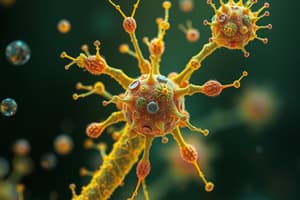Podcast
Questions and Answers
What is the defining characteristic of fungi?
What is the defining characteristic of fungi?
Devoid of chlorophyll
How are viruses different from other microbial groups?
How are viruses different from other microbial groups?
Non-cellular parasites or pathogens
Where do microorganisms occur in nature and why are they important?
Where do microorganisms occur in nature and why are they important?
Everywhere in nature; involved in beneficial and detrimental activities
Flashcards are hidden until you start studying
Study Notes
Microbiology
- Microbiology is the study of living organisms of microscopic size, including bacteria, fungi, algae, protozoa, and viruses.
Characteristics of Microorganisms
- Most microorganisms are unicellular, meaning all life processes are performed by a single cell.
- All living cells contain protoplasm, a colloidal organic complex consisting of proteins, lipids, and nucleic acids.
Major Microbial Groups
Procaryotic Protists
- Bacteria: unicellular, procaryotic, and multiply by binary fission.
- Cyanobacteria (Blue Green Algae): also procaryotic protists.
Practical Significance of Procaryotic Protists
- Cause diseases
- Involved in natural cycling and soil fertility
- Spoil food
- Used in food production, etc.
Eucaryotic Protists
Algae
- Relatively simple organisms
- May be unicellular or aggregations of similar cells with little or no differentiation
- Some algae, like large brown algae, have complex structures with specialized cell types for particular functions.
Studying That Suits You
Use AI to generate personalized quizzes and flashcards to suit your learning preferences.




